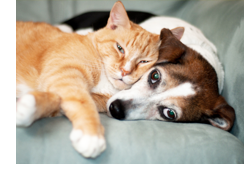
There are several signs of Dementia in senior pets. These signs will warn you that all is not right with your pet and should never be ignored. Many of them may be considered a bit “odd” to pet parents, but all behavioural changes in your pet happen for a reason and should be seen by your vet as soon as possible.
SIGNS OF DEMENTIA IN DOGS
- Pacing & Anxiousness – Your dog looks lost and without purpose, often anxious for no apparent reason.
- Loss of Housetraining – Your dog seems to have forgotten that he or she needs to go outside to relieve themselves.
- Confusion – Your dog may get lost on the wrong side of the door, or in corners of the house. They may seem helpless and unable to figure out what to do next.
- Unusual Barking – Perhaps they are lost and bark in confusion, or they do not recognise a family member or friend.
- Does Not Recognise Family Members – Cognitive dysfunction can cause your dog to seem “distant” with you, sometimes walking away during a petting. They may seem to no longer recognise you or other family members.
- Lack of Appetite – It may seem like your dog “forgets” to eat or loses interest in their food.
- Sleeping Problems – They may seem to have their day and night reversed, meaning they sleep in the day and stay awake and confused at night.
- Lowered Responsiveness – After ruling out possible hearing loss, it may seem like your dog cannot process the command you are trying to give him or her, or that they don’t recognise their own name.
SIGNS OF DEMENTIA IN CATS
- Loud or Strange Noisemaking – Your cat may appear confused or unsure and their level of talkativeness may increase significantly. This may commonly happen at night when everyone is asleep.
- Loss of Housetraining – Some cats will seem to “forget” that they need to visit their litter box to relieve themselves.
- Decrease in Grooming – They seem to no longer care about looking after their coats.
- Agitation or anxiousness – Appears anxious, especially at night.
- Sleeping Problems – They may sleep well during the day and stay up and stress during the night. They may even appear to have separation anxiety during night hours.
- Does Not Recognise Family Members – Your cat seems “distant” with you. They may seem to no longer recognise you or other family members and pets.
- Irritability – Their behaviour changes towards you or other family members.
- Lack of Appetite – It may seem like your cat “forgets” to eat or loses interest in their food.
WHAT TO DO IF YOU SEE THESE SIGNS
Write down everything you observe, when you observe it and how often you notice it happening. This is valuable information for our vets as it will help them diagnose your pet. These symptoms are not always signs of dementia. They can sometimes be signs of pain, arthritis or other senior diseases so we need to rule everything out to make a proper diagnosis.
Please call Pet Doctors on 5576 0400 for more information.

